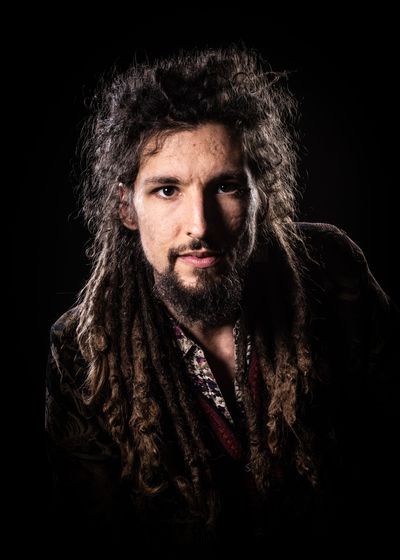Singer-songwriter Dario Re takes the path less traveled toward success in music industry

Living as an independent artist is financially complicated. The music industry, as any weathered musician will tell you, often feels like a cut-throat capitalist world dominated by the big names and major labels. Carving out a living on one’s own in such a space is difficult, but it can be rewarding.
Dario Re is a local artist who works across mediums, chiefly as a solo musician and as front man for the band Heat Speak, but also as a visual artist. Where the majority of independent artists trying to “make it” on the scene will turn to the beaten paths of labels, promoters, agents and managers, Re has decided to go in a different direction.
Dario Re recently made all of his art and music free to the public, operating instead off of a donations and patron-based model.
The fundamentals are very simple: “if you like (the art) that’s all that matters.” You have the opportunity, then, to financially support its creator. “You’re supporting an artist based on their trajectory and their ideology and their methodology,” he said.
“I think it’s trying to divert the more capitalist mindset of art,” he added. As Re sees it, the current music and art markets are extremely saturated. “We’re all just spending lots of energy and time creating stuff that may or may not be market value. I don’t think art should have that market value attached to it.”
Although his model might seem radical, it in fact harkens back to the time before capitalism. Artist have long benefited from the support of the wealthy or royal. The most famous example, perhaps, is the Earl of Southampton’s patronage of William Shakespeare.
But Re isn’t laying tracks back into the past. His invitation to contribute is a modern one, with a website, taking full advantage of the democratization of the internet.
“It doesn’t change anything for me to share (a music video) with one person here at my computer or to put it on YouTube and share it with the whole world,” he said. On his website, “people can sign up for free and receive all my music and my artwork,” with the opportunity to contribute to the work financially.
The patron-based model, while it doesn’t entirely ease the financial strains of independent artistry, does address some of the issues at the core of a typical music release schedule.
When an artist releases an album, they tour in support of it and see a large increase in sales and income: “There’s an influx of money.” But then, between records, when the creative process is at work, there’s “just a dearth.”
Monthly recurring patronage allows people to “support me just as much when the album is freshly released … as when I’m tending my garden, and filling my cup with ideas that are going to turn into songs and creativity.” It’s an alternative to placing value exclusively on a product. Instead, value is recognized in the time and people in and around the creation of a piece of art.
Re recently released a new solo album, “Holy Moon,” which he toured all over the Pacific Northwest. “Our donation-based shows were the most successful,” he said.
The new record is full of surprises, drawing on a wonderful set of sounds and instruments, from guitar and piano to accordion and the sound of chickens. Re’s music is intuitive and original. There is something elastic in the way it moves. From the first, bouncy piano track, “Climb Until You Know,” the listener is invited to drift along in an dreamlike current of sound.
“Chippy Lean Grass” is one of the record’s standouts, a bizarre combination of wry, almost eerie dynamics, snappy tempos, and empty space. The song works because it never truly repeats itself, working through its musical motifs in new ways each time they recur.
Re’s writing process for “Chippy Lean Grass” was as novel as the resulting song. Re wrote, recorded, mixed and mastered the track all in one go, and following that up immediately with a music video. It was an unusual method even for Re, who said “for the most part, I’ll write songs, I’ll play them live and (…) eventually record them.”
Though it’s tempting to call Dario Re’s music experimental, or to say the same about his patron-based income model, he doesn’t think of them that way, or not in such terms. “I’m just kind of following an instinct,” he said.
Following that instinct will not be easy, though. A world in which artists have the space to create, to reflect, to not feel the pressures of a product-oriented economic system, he wagers, will be one with better art and happier artists. But, by and large, this is not the world we live in now.
The question Re asks is, “how do we get the culture at large to carry that concept and actually believe it?”
For more information on Dario Re and access to all of his work, visit his website at www.DarioRe.com. There you can also find a list of upcoming live shows.